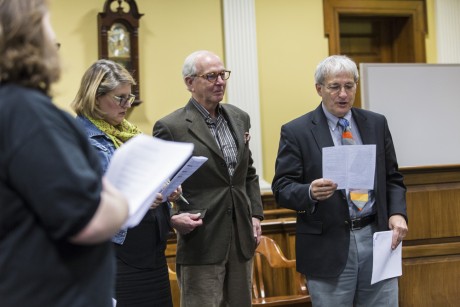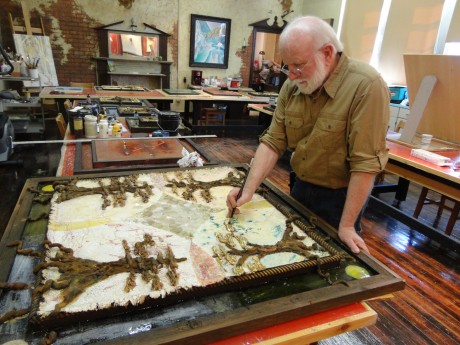
Ralph Cohen directs attorney John Haley as Constable of the Watch from “Much Ado About Nothing”. Photo by Sarah Finnegan.
Birmingham’s most satisfying weekend of theater takes place near winter’s end each year in a large room at a law school. That’s when a roving band of actors from the American Shakespeare Center comes to Samford University to present William Shakespeare’s plays in the manner of their original performance — without lights, without sets and without proscenium.
We wrote last year about the inspiration for this weekend. Kim West, a lawyer practicing at Wallace, Jordan, Ratliff and Brandt, also teaches perhaps the world’s only course on Shakespeare and the law for students at Cumberland School of Law. As part of this year’s event, held last weekend on campus, she invited the co-founder of the ASC, Dr. Ralph Alan Cohen. No stuffy professor he, the Alabama native authored ShakesFear and How to Cure It: A Handbook for Teaching Shakespeare and has become one of the world’s most honored directors and producers of the Bard during his 27 years with the ASC in Staunton, Virginia.
Weld: While you were attending Sidney Lanier High School in Montgomery, did you get a leg up on learning Shakespeare because their football team was called the Poets?
Ralph Cohen: I think of that all the time, and though you’re kind of kidding, you shouldn’t be, because you don’t have to read much Faulkner to know that Southerners love language; we like telling stories, and Shakespeare tells great stories. I had a wonderful teacher, Ms. Terry was her name, and she would stand on the desk and perform the three witches [from Macbeth], even at her old age, which was 10 years younger than I am now. I had great English teachers in Montgomery.
Weld: Did your teachers do what you warn against in ShakesFear, teaching the plays just from the printed page?
RC: Yes, every one taught it that way, except Ms. Terry, who stood on a desk and performed. So when I wrote the book, I was thinking of some very good teachers who didn’t have very good methods when it came to Shakespeare.
Weld: Is there a particular aspect of Shakespeare’s work that captured your imagination?
RC: I remember at Huntingdon College, down in Montgomery, as a five year-old, seeing a production of Midsummer Night’s Dream, so I was exposed, but I, like everybody else, or most people, though of it as nice and old and not about me. Then in college I was a film buff. I belonged to the Dartmouth Film Society and they brought in — and I was irritated at first — [Sir Laurence] Olivier’s Henry V…I found myself lost in it.
There’s a moment when the king has conquered France, and with it he has conquered the princess (and really, she’s booty). He says to her, “Can you love me?” and she says, “Is it possible that I should love the enemy of France?” And I thought, that’s so good, Shakespeare. I could believe that this was an honest romance. Then the king, played by Olivier, says, “No. It is not possible that you should love the enemy of France,” I thought, wow, this is a really honest play. “But in loving me, you shall love a friend of France” — and then he wiped it away — “and I love France so well that I will not part with a village of it.” And I thought, oh, my God. That was a moment I realized William Shakespeare is a lot smarter, more cynical, more satirical, funnier than I am. At that moment, that’s when the doors opened for me.
Weld: You and your former student Jim Warren started something called Shakespeare Express in 1988. Was that a repertory company?
RC: Actually, we started with a production of Richard III that Jim directed, then we did a spring production of The Taming of the Shrew that he directed, and then I directed Julius Caesar. Each of those was a single play, but the next year we added a second play, and then for many years we toured with three plays in repertory. Then since we opened our company at home, we have anywhere from three plays to five plays always going.
Weld: Was it tough going early on, when you were trying to mix commerce and art with your small company?
RC: The interesting thing is — and I guess I shouldn’t admit it — it wasn’t costing a lot of money to make it happen. I was a full professor, so the company, which was a separate thing, whether or not it failed, it wasn’t going to matter to me. There wasn’t much of a budget at that time, so it didn’t feel tense. Now, Jim, for him it was dead serious, because that was his job. It allowed me more risk, and I had the good fortune of having someone who worked as though his life depended on it. I could have big ideas and try new things and not be very worried if it looked like we were going to fold. Now, of course, I feel very differently because we have a big budget and a lot of actors depend on us.
Weld: Was it your intention to present Shakespeare in its original style from the get-go?
RC: Yes, it was…however, I think it’s important to say that we never wanted to be a Renaissance Faire type of thing. It was basically the configuration of the audience, the lights on, two hours and out. Those are the most important three rules. But from the start, there was a regard for the actual stage directions and, super-important, above all, there was a regard for what are the words. I think that’s at the heart of who we are.
Weld: That led eventually to your being able to build your own playhouse in Staunton in 2001. You chose to build the world’s first recreation of Shakespeare’s indoor playhouse, the Blackfriars, instead of his more famous theater, the outdoors venue called the Globe.
RC: That was because my friends over in London had just built a Globe. [A reconstruction of the original, spearheaded by actor/director Sam Wanamaker, opened in 1997.] And also, if you haven’t been to the Globe in London, then you’re skeptical of a building where it rains on you and you have to stand up. In many ways, it was easier to sell the people of Staunton on an indoor theater, and that was better for me, in a way, because there wasn’t one, so we could say we were the first.
Weld: I watched a TEDx talk you gave in Charlottesville in 2013, and two phrases you used caught my attention. What is this thing you call “technological chauvinism”? You say it’s what did in the original mode of presenting plays.
RC: I think that today some people who look at what we’re trying to do see it as somehow “museum theater,” and I hate that idea. People who take pride in having been part of a world with iPads and iPods that can do virtually any kind of video thing, they have trouble separating that from what theater actually is, which is not dependent on those things at all. I think that gets in the way of figuring out how important an audience really is.
Technology allowed us to turn the lights off on an audience, and when they did that, they took away one of the three legs of the stool — you have the writer, the actor and the audience. They took out the audience, and Shakespeare didn’t write a single play where the audience isn’t being addressed in one way or another. So we put the audience back in, and that’s what I mean by technological chauvinism. I have people say to me, you know, if Shakespeare could have used lights, he would have, and I say back, “Well, I don’t know that.” He might not have. but I do know that if he did do that, he might have made movies instead. In other words, it’s a different art form with the lights out.

Federal Judge Thomas W. Thrash Jr. hears Dogberry’s statement, from “Much Ado About Nothing”. Photo by Sarah Finnegan.
Weld: The other term you discussed was “ambient attention,” describing the way an audience interacts, or doesn’t, with an actor.
RC: Right. Ambient attention is no problem for an actor if the audience is in the dark, because you can’t see it. They might hear it, or they might hear the lack of anything. I’ve heard actors who’ve been in front of a dark house going, God, it was like nobody was in there. But I think that it’s really healthy to have an audience there, that ambient attention puts an actor at his best because he has to try to work for it, for whatever he gets, and he does know when he has overcome ambient attention. It’s like having a director right by you going, ‘Good job, good job.’ If you have enough of that, then you become a better actor. In fact, the whole time you’re acting, you’re getting stimulus that will help you in being a better actor. I think it’s a really important thing.
Weld: Are there contemporary plays that could be performed with the ASC approach?
RC: Very many. Jim has directed Rosencrantz and Guildenstern Are Dead three times. There are a bunch of them. Now, I have a different feeling about this than Jim. One of my arguments for doing it the way we do it is that this is what Shakespeare had in his head and therefore the words match better. Jim thinks we should do this with all plays. My argument would be, not so much people who have already written plays ought to be done this way, but that we ought to be writing more plays for this. If you look at Off-Broadway stuff and fringe theater, you’ll find a lot that works perfectly for this, because those writers were not imagining the kind of expensive resources that more successful writers do.
Weld: I read that you think Antony and Cleopatra is the best Shakespeare play; certainly it’s your favorite. That’s not necessarily a consensus pick.
RC: The flip side of it is [King] Lear, and a lot of people talk about Lear. People that I respect a whole lot think it’s Twelfth Night. Not anybody much thinks it’s Hamlet, by the way. It is a great work, but it’s cumbersome in ways that Lear and Antony and Cleopatra and Twelfth Night are not.
The thing I love about that play is that it lets in all the possibility of the world. It is a play about opposites: East and West, life and death, love and hate, black and white, male and female — you can go on and on. It’s about duality. Everything is written in paradox.
The language is simple and concise. People who study language will all agree that, even if it’s not their favorite play, [Shakespeare] is never writing more beautifully than he wrote in that play. It’s like poetry, but it’s also like just what you would say. “I am fire and air” doesn’t sound like poetry, but it is.
I’ll tell you my Antony and Cleopatra story. I was saying some things to one of my classes in 1975, and there was a very smart woman in that class who never said anything and seemed to dislike me entirely. Then I learned she was the dean’s daughter. When I got to Antony and Cleopatra, I had some things to say about the way that play puts Cleopatra on Christ’s side and the Romans on the other side; some things that could have been shocking some people, I guess. I said that the East has religions that believe a lot more in the next life than we do, and this play really illustrates a woman and her entire court that just absolutely feels there’s this other world.
This hand went up, and it’s the first time she’s ever talked in class. She said, “I was in a retreat with the Maharishi Mahesh Yogi” — the Beatles’ guru — “and at the end of the retreat, someone asked the Maharishi if anyone had ever reached a state of perfect understanding. And he said, ‘Yes. One man. William Shakespeare, when he wrote Antony and Cleopatra.’” And the whole class went Whoaah. …
But there’s something really magical for me about that play. That’s about a point of view as much as it is about architecture and verse and plot and all of that, but I think that play just leaves me exhilarated and full of sunshine.
Weld: I gather you’re serenely untroubled by the possibility that the historical personage William Shakespeare might not have written the plays that bear his name.
RC: Supremely. Supremely. No doubt in my mind, and I believe with all my heart that Obama was born in Hawaii, and the people who want to believe the other, there’s nothing about the evidence that we have, the fact that we have so much evidence, that will ever change their minds. It’s always a fruitless conversation…William Shakespeare wrote Shakespeare, but if you need it to be someone else, I guess there’s no harm in that.
Weld: After spending much of your life immersed in the world of Shakespeare, how has your understanding of the plays evolved?
RC: That’s a wonderful question. The prior question, meh, but that’s a wonderful question. Here’s the thing, I think, that makes us all wonder how to deal with Shakespeare. The more we look at it, the more we can’t believe it. It just seems like the Grand Canyon or something like that. I love other playwrights and I love other plays, and I have a colleague at Mary Baldwin College who intensely dislikes what he calls “this Bardolatry.” But he himself sees, and we all see, so many layers. …
There’s not a time in class, not a time in rehearsal, that I’m not making a further discovery, to quote my good friend Stephen Booth, that “Shakespeare is our most underrated writer.”
Weld: It’s hard for me to imagine any of our contemporary playwrights coming up with something that’ll last 400 years.
RC: I’m not very fearful that he won’t last another 400 years. Judi Dench is a friend, she was talking to a class once, and a student asked her what’s the difference between playing Hedda Gabler and Cleopatra, or any Shakespeare character. She said, “Well, Hedda Gabler’s a great part. It’s a wonderful thing, you know, you can get hold of it and think you really got it, and it’s fun.” She said, “The difference with Shakespeare is, it’s so multi-faceted. You think you’re looking at it one way, and then you twist it a little bit and it’s another thing. It’s endlessly entertaining for the actor to think about it, because it keeps fitting.”





